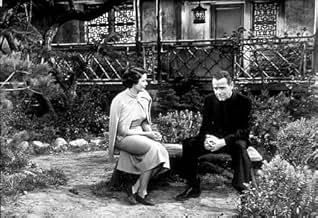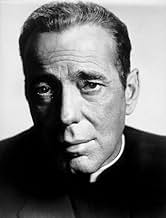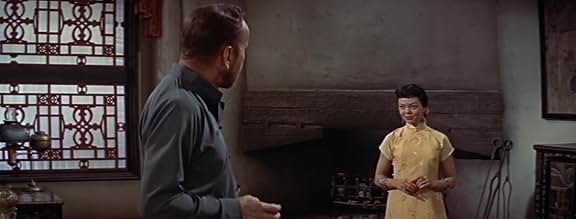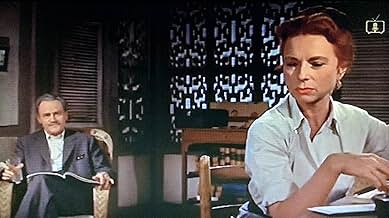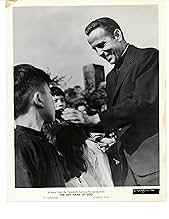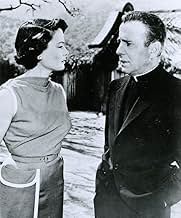At a Catholic mission in China, long-awaited "Father O'Shea" proves to be a tough guy, disturbingly attractive to mission nurse Anne.At a Catholic mission in China, long-awaited "Father O'Shea" proves to be a tough guy, disturbingly attractive to mission nurse Anne.At a Catholic mission in China, long-awaited "Father O'Shea" proves to be a tough guy, disturbingly attractive to mission nurse Anne.
- Director
- Writers
- Stars
Robert Burton
- Rev. Marvin
- (uncredited)
George Chan
- Li Kwan
- (uncredited)
Sophie Chin
- Celeste - Nurse
- (uncredited)
Peter Chong
- Fen Tso Lin - Merchant
- (uncredited)
Doris Chung
- Clinic Nurse
- (uncredited)
Richard H. Cutting
- Father O'Shea
- (uncredited)
Don Forbes
- Father Keller
- (uncredited)
Candace Lee
- Girl Singing 'My Old Kentucky Home'
- (uncredited)
- Director
- Writers
- All cast & crew
- Production, box office & more at IMDbPro
Featured reviews
You won't get the urge to hail with hallelujahs, but you'll walk away shrugging, and mumbling what the, especially when Yang's encountered, but the film was always downward, poor Lee J. Cobb is quite the opposite of stupendous. You may also have concerns about the mule, although there's several that compete to trick and fool, with a story that's so thin, Bogey's a fogey and quite thin, deserving better than this festering pustule. At least it's short which means you don't have to endure, a bit less than 90 minutes of Yak manure, but you'll not forget poor Lee, an Asian minstrel - could he see? A film with very low appeal, without allure.
Considering it provides a rare opportunity to see Bogart in colour, is set during the civil war in China, Bogart pretends to be a gun-toting priest in his most bizarre role since playing a vampire over fifteen years earlier in 'The Return of Dr X' and Lee J. Cobb plays a Chinese warlord, you come out of it thinking "is that it?"
Bogart looks very old and tired, but he and the rest of the cast all do good work; although Victor Young's obtrusive score over-eggs the pudding as usual.
Bogart looks very old and tired, but he and the rest of the cast all do good work; although Victor Young's obtrusive score over-eggs the pudding as usual.
Father O'Shea, arrives at a Catholic mission in 1947 China, though his methods at first seem heavy handed, the villagers come to admire and respect him. But the longer he stays there the closer he gets to Anne, a pretty nurse who herself is strangely drawn to this unorthodox priest, it is just a matter of time before the truth will out and secrets are about to become uncovered.
Based on the novel by William E. Barrett, The Left Hand Of God just about registers as an interesting piece. I would go as far to say that it's merely the presence of some big name actors that have stopped this one from being panned wholesale. The acting is fine, Humphrey Bogart takes the lead as Father O'Shea, restrained and committed to the role he is, but it's not really a role calling for anything out of the ordinary. Gene Tierney plays Anne and barely has enough written for her to flourish, and this accounts for a distinct lack of chemistry between herself and Bogart. Gruff nasty villain duties fall to Lee J. Cobb, who in his oriental makeup now looks incredibly dated and sadly, laughable. The story will be of interest to those of religious beliefs, and at its heart the redemption fable is to be roundly applauded, but the whole movie drags to its inevitable conclusion and come the warm finale i personally felt that it's such a waste of talent. Yes it's touching at times, and yes its point is well and truly made, but ultimately it's a very forgettable piece of interest to Bogart and religious purists only. 5/10
Based on the novel by William E. Barrett, The Left Hand Of God just about registers as an interesting piece. I would go as far to say that it's merely the presence of some big name actors that have stopped this one from being panned wholesale. The acting is fine, Humphrey Bogart takes the lead as Father O'Shea, restrained and committed to the role he is, but it's not really a role calling for anything out of the ordinary. Gene Tierney plays Anne and barely has enough written for her to flourish, and this accounts for a distinct lack of chemistry between herself and Bogart. Gruff nasty villain duties fall to Lee J. Cobb, who in his oriental makeup now looks incredibly dated and sadly, laughable. The story will be of interest to those of religious beliefs, and at its heart the redemption fable is to be roundly applauded, but the whole movie drags to its inevitable conclusion and come the warm finale i personally felt that it's such a waste of talent. Yes it's touching at times, and yes its point is well and truly made, but ultimately it's a very forgettable piece of interest to Bogart and religious purists only. 5/10
Great movie stars are rarely great actors. But they are people who exude elements of humanity, which we'd like to possess- John Wayne's toughness, Sharon Stone's glamour, Gary Cooper's inner silence, or Michael Douglas's ruthlessness. More unique than acting talent, Humphrey Bogart's element was that of hardened sinner whose inner spark of decency wasn't entirely subsumed. In this Cinemascope/colour movie, where Bogie's late-night drinking and myriad of broken marital relationships was visibly etched upon every facial crevice, the idea that he could pass himself off as a priest was ludicrous. But THE LEFT HAND OF GOD never demands that of him- nor us.
It makes instead, the not impossible proposition that a simple, remote Chinese community traumatised by marauders might presume Bogie to be the 'priest of Christ' they so anxiously await. We the audience, are privy to who Bogey is and still is. His un-Godly skill, which ultimately saves the mission from General Yang's terror, is entirely in character.
The Catholic theology was also dead on. Those whom Bogie absolved, married and buried were spiritually exonerated by the very innocence we moviegoers cannot share about Bogart. The power of the central argument of William Barrett's much dissipated novel, in spite of -or maybe because of, 50's Hollywood formulaic moviemaking- is somehow preserved.
The repetitious references to Bogey as 'the priest of Christ' and the ingenuous children's enigmatic broken-English farewell of 'Oole Kantackee Hom,' also persuade. We know Bogey must leave, and that he is redeemed in spite of himself. Even Bogie doesn't know that. We now also know that this life-scarred, bloodshot, poker-playing sceptic received a fair Hearing- after dying from throat cancer less than two years later on January 14th 1957 -at least from the left Hand Side of his Maker.
It makes instead, the not impossible proposition that a simple, remote Chinese community traumatised by marauders might presume Bogie to be the 'priest of Christ' they so anxiously await. We the audience, are privy to who Bogey is and still is. His un-Godly skill, which ultimately saves the mission from General Yang's terror, is entirely in character.
The Catholic theology was also dead on. Those whom Bogie absolved, married and buried were spiritually exonerated by the very innocence we moviegoers cannot share about Bogart. The power of the central argument of William Barrett's much dissipated novel, in spite of -or maybe because of, 50's Hollywood formulaic moviemaking- is somehow preserved.
The repetitious references to Bogey as 'the priest of Christ' and the ingenuous children's enigmatic broken-English farewell of 'Oole Kantackee Hom,' also persuade. We know Bogey must leave, and that he is redeemed in spite of himself. Even Bogie doesn't know that. We now also know that this life-scarred, bloodshot, poker-playing sceptic received a fair Hearing- after dying from throat cancer less than two years later on January 14th 1957 -at least from the left Hand Side of his Maker.
Interesting that The Left Hand of God should be directed by Edward Dmytryk one of the famed Hollywood 10 and the only one to recant and admit his Communist Party involvement so he could beat the blacklist and resume work. Dmytryk like Bogart in the film pretended he was something he wasn't and submitted himself for a kind of absolution.
Flier James Carmody is shot down while flying the hump in Kuomintang China during the Thirties and he's shot down in an isolated area where Chiang Kai-shek's writ doesn't run. He gets drafted into warlord Lee J. Cobb's army and then deserts, using the disguise of a recently deceased priest who got himself deceased by one of Cobb's men.
Like William Holden in Bridge Over the River Kwai, Carmody played by Bogart is forced by circumstance to keep up the appearance. He wins over a lot of the villagers where the deceased priest was headed for. And he also wins over missionary lady Gene Tierney. And he becomes involved in a rather dubious miracle that saves the village.
The key here is that Bogart is a lapsed Catholic himself in the film. Otherwise the whole thing would have no meaning whatsoever. Even so, I'm still dubious myself about Bogart's attitude when all's said and done.
Plot elements can be found as I said in The Bridge on the River Kwai and later on it was played for comedy in a military setting when Glenn Ford pretended he was a general in Imitation General in an obscure corner of the European theater in World War II.
Bogey fans will consider this film a must, others can take or leave it.
Flier James Carmody is shot down while flying the hump in Kuomintang China during the Thirties and he's shot down in an isolated area where Chiang Kai-shek's writ doesn't run. He gets drafted into warlord Lee J. Cobb's army and then deserts, using the disguise of a recently deceased priest who got himself deceased by one of Cobb's men.
Like William Holden in Bridge Over the River Kwai, Carmody played by Bogart is forced by circumstance to keep up the appearance. He wins over a lot of the villagers where the deceased priest was headed for. And he also wins over missionary lady Gene Tierney. And he becomes involved in a rather dubious miracle that saves the village.
The key here is that Bogart is a lapsed Catholic himself in the film. Otherwise the whole thing would have no meaning whatsoever. Even so, I'm still dubious myself about Bogart's attitude when all's said and done.
Plot elements can be found as I said in The Bridge on the River Kwai and later on it was played for comedy in a military setting when Glenn Ford pretended he was a general in Imitation General in an obscure corner of the European theater in World War II.
Bogey fans will consider this film a must, others can take or leave it.
Did you know
- TriviaWilliam Faulkner completed an adaptation of the 1950 novel for Director Howard Hawks, a longtime collaborator, but the results were deemed "rather dull and sincere, with an abundance of narration" by Hawks biographer Todd McCarthy, and was shelved.
- GoofsThroughout the climactic confrontation as Carmody and Mieh Yang sit next to each other, Mieh Yang's bald head shifts repeatedly between sunshine and shadow.
- Quotes
Dr. David Sigman: [of prostitutes] Don't tell me the Church gives up on 'em, father! Medicine doesn't give up...
Jim Carmody: When medicine reaches a point where it never has to walk hopelessly away from a case, then you can criticize the Church because it left some... spiritual illness uncured.
- ConnectionsReferenced in Plucking the Daisy (1956)
- SoundtracksA LOAF OF BREAD
Written by Ken Darby (based on traditional "The Old Gray Goose")
Sung by Humphrey Bogart and Gene Tierney
- How long is The Left Hand of God?Powered by Alexa
Details
Box office
- Budget
- $1,785,000 (estimated)
- Runtime
- 1h 27m(87 min)
- Color
- Aspect ratio
- 2.55 : 1
Contribute to this page
Suggest an edit or add missing content

